Age, Ageing and Wellbeing in later life
Download as pptx, pdf1 like826 views
This document examines the effects of aging on subjective well-being in later life using data from the English Longitudinal Study of Aging. It finds that measures of well-being such as quality of life and depressive symptoms continue to decline with age even after controlling for circumstances, but life satisfaction increases with age after accounting for conditions. The study explores how aging relates to different conceptualizations of well-being and whether its effects can be explained by declining health and social factors.
1 of 19
Downloaded 12 times
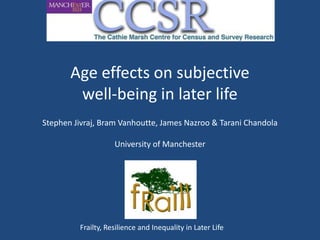
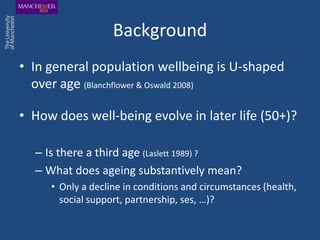
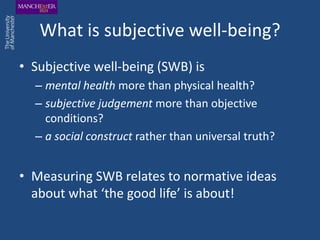

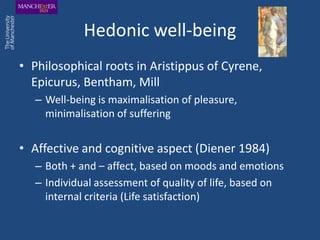
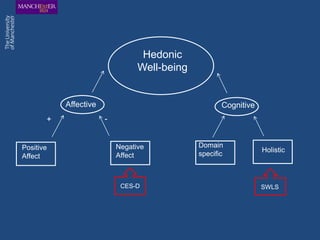
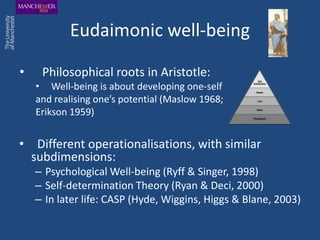
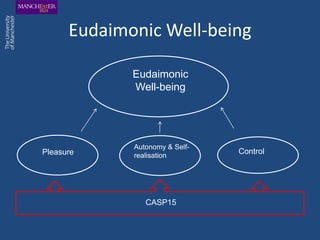
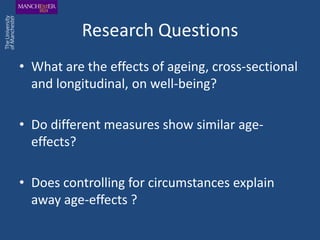
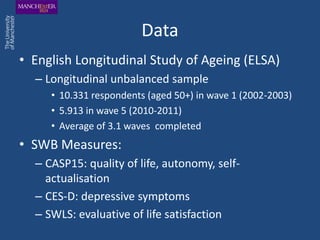
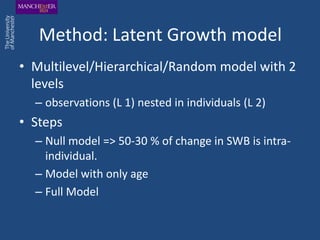
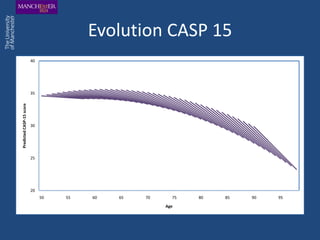

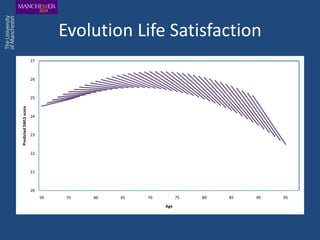
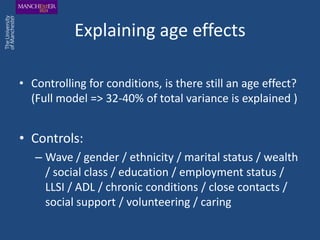
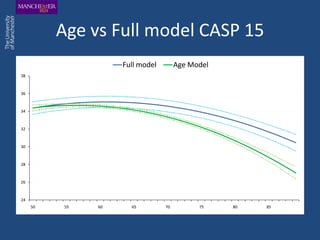
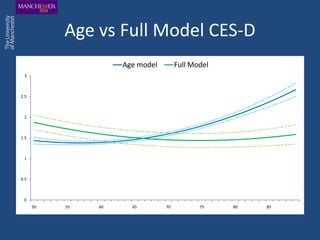
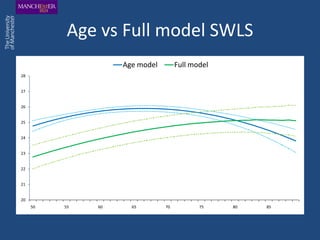
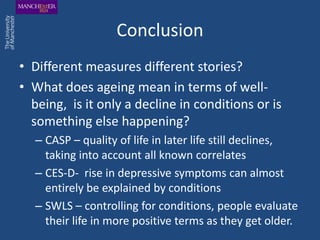
Ad
Recommended
Later Life Forum briefing paper
Later Life Forum briefing paperOpportunity Links
╠²
The Later Life Forum investigated the provision of information for older people and found that while there is a growing focus on cross-functional policy, local information services are fragmented and lack consistency. Key themes from a practitioners' forum included the need for trusted information delivery that meets diverse cultural needs, as well as collaboration across different sectors to improve access. The document highlights the urgency for common standards and systemic change to empower older adults and their caregivers in accessing necessary information.Love Later Life: Learning from AgeUK's Wellbeing Work
Love Later Life: Learning from AgeUK's Wellbeing WorkUniversity of Bath
╠²
Age UK aims to enhance the wellbeing of older individuals, emphasizing the importance of health and prevention in later life. The organization operates through a network of local partners to provide tailored health advice and services, with various projects focused on fitness, mental health, and support for chronic conditions. Notable successes include personalized assistance leading to improved health outcomes for participants, such as reduced insulin needs and better mobility for individuals like Yvonne.life course pathways to later life wellbeing
life course pathways to later life wellbeingBram Vanhoutte
╠²
This document discusses how socioeconomic factors across the life course influence subjective well-being in later life. It presents three life course models - critical period, accumulation, and social mobility - and focuses on testing the accumulation model using data from the English Longitudinal Study of Aging. The study examines trajectories of affective, cognitive, and eudaimonic well-being based on participants' occupational class at three time points: parents' occupation at age 14, own education level at age 20, and own occupation at age 50. It finds support for the accumulation model, with diverging well-being trajectories in the third age but leveling off or convergence in the fourth age.Our Agenda for Later Life
Our Agenda for Later LifeAge UK
╠²
The document outlines Age UK's agenda for improving later life in the UK. It discusses key demographic trends showing an aging population and increasing costs of state pensions, healthcare, and care. It identifies challenges such as income and health inequality, loneliness, lack of savings and pension plans, and age discrimination. Age UK aims to address these challenges through a wide range of services, research, and advocacy to improve conditions for the aging population in the UK through 2020 and beyond.The sociology of the life course 6 later life with emphasis on vietnam and t...
The sociology of the life course 6 later life with emphasis on vietnam and t...brunogiegerich
╠²
The document explores the sociology of later life, with a focus on aging in Vietnam and the industrialized West. It discusses the shifting perceptions and status of the elderly in contemporary society, highlighting challenges such as ageism, loneliness, and the cultural differences in respect towards elders. Additionally, it addresses demographic changes and the potential future implications for the elderly population in Vietnam amidst modernization.Pages from mh later in life guidebook final preview
Pages from mh later in life guidebook final previewKatelynn Wertsch
╠²
The cover photo depicts a 77-year-old woman who regularly volunteers in her community and spends time with her family enjoying nature. The document is a guidebook for older Marylanders and their caregivers about maintaining mental health in later life. It acknowledges that nearly 1 in 4 older adults experiences some type of mental health problem not related to normal aging, and emphasizes the importance of maintaining mental health for physical health, relationships and enjoying life. The guidebook provides information on healthy aging, common mental health concerns, chronic illnesses, substance use disorders, and resources for treatment and support.Islamic Economic system Vs Capitalist System (urdu)
Islamic Economic system Vs Capitalist System (urdu)Naveed Butt
╠²
This document contains data on wealth distribution in several countries and precious metal prices. Wealth in Switzerland, the United States, Denmark, France, and the UK is concentrated among the top 10% of citizens, who own over half of the total wealth. Gold and silver prices per gram from 2010 are provided, as well as Islamic weights and prices of coins based on those weights. Tax rates of 12% and 20% are listed without context.ELSA poster
ELSA posterIlana Levine
╠²
1) Older people who found that their age prevented them from doing activities or who worried about health declines and loneliness had more negative experiences of aging.
2) Marital status, health issues, and occupational status were associated with views on aging, with married people and those with higher status having more positive views.
3) Addressing self-ageism and ensuring social connections and opportunities can help older adults have more positive experiences as they age.Workshop on well being over the life course agenda layard
Workshop on well being over the life course agenda layardStatsCommunications
╠²
The document outlines a framework for policy-makers to maximize wellbeing through the evaluation of childhood influences and their impact on adult life-satisfaction. It discusses key predictors of successful life outcomes, emphasizing the importance of emotional health, educational achievement, and family background. Additionally, it addresses the role of policies and cost-effectiveness analysis in improving overall wellbeing across the life-course.A03510108
A03510108inventionjournals
╠²
This study investigates the relationship between age, emotional intelligence (EI), and leadership effectiveness among healthcare professionals in India. Findings indicate that healthcare leaders over 30 years of age exhibit higher EI scores compared to their younger counterparts, though satisfaction levels remain similar across ages. The research emphasizes the significance of EI in enhancing leadership styles and overall effectiveness in the complex healthcare environment.2012 Presentation - Existential and Psychological Health as Products of Intri...
2012 Presentation - Existential and Psychological Health as Products of Intri...Nick Stauner
╠²
The document presents a study that examined how attaining personal goals impacts existential and psychological well-being. It hypothesized that attaining goals would boost well-being, and that effects would be stronger for goals that were autonomously motivated or intrinsically oriented rather than controlled or extrinsic. The results supported these hypotheses, finding that goal attainment significantly predicted increases in well-being and that intrinsically motivated goals had a greater impact.2 carmel- assisted living - prague may 20 2012-final
2 carmel- assisted living - prague may 20 2012-finalifa2012_2
╠²
The study compared the subjective well-being of 215 assisted living residents and 215 community-dwelling elderly individuals in Israel. It found that assisted living residents rated their satisfaction with life, successful aging, happiness, morale, and loneliness significantly higher than community dwellers. Type of residence was a stronger predictor of subjective well-being than other factors like age, gender, and health. The findings challenge the assumption that community living is always preferable for elderly adults and indicate that assisted living may better support well-being. More research is needed to verify these results.adulthood.pptx
adulthood.pptxMuhammadAbdullah564731
╠²
This document discusses physical, cognitive, and socioemotional development across early, middle, and late adulthood. In early adulthood (ages 20-40), physical development is complete and identity is established through relationships, careers, and beliefs. Middle adulthood (ages 40-65) involves parenting, careers, and meeting goals as physical decline begins. Late adulthood sees further physical aging, adjustment to loss of abilities, and facing end of life through stages of acceptance and with support of hospice care.Life Interview Project
Life Interview Projectchasedaugherty
╠²
This document summarizes life interviews from three individuals at different stages of life: a 20-year-old male college student, a 46-year-old female district manager, and a 69-year-old female healthcare provider. The interviews covered topics like health, aging, relationships, personality, and views on different stages of life. Overall, the interviews provide a view of how individuals perceive these areas at different ages and life stages.Happiness in a pandemic
Happiness in a pandemicRobert J Miller MD
╠²
This document discusses aging and happiness. It notes that most studies show a U-shaped curve for age and happiness, with happiness lower in midlife and higher in older age. However, aging does not have to result in declining happiness. Factors like maintaining social connections, having a sense of purpose, and focusing less on comparisons can help people experience increasing life satisfaction as they age. The document provides recommendations for cultivating happiness, including pursuing engagement, relationships, meaning, and accomplishment.Psychological issues in elderly
Psychological issues in elderly Doha Rasheedy
╠²
1) The document discusses several theories of aging at the biological, psychological, and social levels. It covers theories such as lifespan development theory, selective optimization with compensation theory, and socioemotional selectivity theory.
2) Cognitive theories of aging propose that fluid abilities decline with age while crystallized abilities remain more stable or increase. Changes in processing speed, working memory, and sensory perception are well documented in aging.
3) Personality theories focus on stability of traits over the lifespan as well as changes in goals, values, and coping styles. Core personality remains stable in aging while priorities and coping strategies may subtly change.Successful ageing (1).pptx
Successful ageing (1).pptxJordan Stephen
╠²
This document provides an overview of the concept of successful aging. It discusses the historical development of the concept and various definitions and models that have been proposed. It describes early biomedical models that defined successful aging primarily based on absence of disease and high physical and cognitive functioning. More recent psychosocial models emphasize adaptation, life satisfaction, social engagement, and personal growth. The document also discusses theories and studies that have expanded the concept to be more inclusive of aging individuals facing illness or limitations through adaptation and use of internal and external resources.SEI-YV Presentation
SEI-YV Presentationfieddijk
╠²
The SEI-YV (Social-Emotional Intelligence for Youth) measures emotional intelligence for individuals aged 7-18, providing a framework for self-awareness, self-management, and self-direction. With psychometric strength supported by extensive validity and reliability studies, it offers practical applications in various educational and coaching contexts. The document emphasizes the importance of emotional intelligence in improving life outcomes, including personal achievement, relationship quality, and overall life satisfaction.1. aging is a developmental process.
1. aging is a developmental process.JainahRose
╠²
This document discusses concepts related to aging, including normal aging processes and factors that influence cognitive aging. It covers the following key points:
- Aging is a gradual process that occurs over many years and decades, with age 65 commonly marking the start of "old age". Cognitive abilities typically decline in areas of processing speed, working memory, and sensory perception.
- Brain imaging studies show atrophy and white matter changes associated with aging, most prominently in the prefrontal cortex. Genetic and environmental factors also influence cognitive aging.
- Personality and emotions tend to remain stable in older adults or show improvements in areas like emotional regulation. Social roles and relationships also influence well-being, as older adults navigate changesNfhk2011 pia vedel ankersen_parallel7
Nfhk2011 pia vedel ankersen_parallel7NFHK2011
╠²
Young people experience high stress levels due to various factors related to their personal experiences and societal expectations, as highlighted in a study conducted in Central Denmark. The study utilized both qualitative interviews and quantitative surveys to analyze stress by age, gender, and educational background. Key findings suggest that experimenting with life choices, managing relationships, and balancing responsibilities contribute significantly to their stress.1 -Intro 362 fall 11-2.pptx
1 -Intro 362 fall 11-2.pptxazaliaotd
╠²
This document provides an overview of Psych 362, a course on the psychological and psychosocial stages of maturity and aging. It discusses several key topics:
1. Why studying aging is important due to increased lifespans and the aging population.
2. Theories of aging, including the traditional view of aging as deterioration versus the lifespan developmental view that sees aging as lifelong adaptation.
3. Research methods in developmental psychology including cross-sectional and longitudinal study designs.
4. Key aspects and benchmarks of the aging process in the physical, psychological, and social domains. It notes there is variability between individuals.Psychological Aging Presentation
Psychological Aging PresentationWendy
╠²
Psychological aging is complex and varies between individuals depending on personality and ability to adapt. Those who adapt well maintain an openness to experience, flexibility, creativity, empathy, self-belief, strong social support, and sense of adventure. Several theories explore cognitive, social, and personality development with aging. These include lifespan development theory, selective optimization with compensation theory, and socioemotional selectivity theory which posit changes in cognitive abilities and social interactions with age. Personality is also theorized to change or remain stable depending on the individual. Maintaining playfulness and a positive outlook through social engagement may help optimize aging.Longivity vs quality of life
Longivity vs quality of lifeismail sadek
╠²
The document discusses the aging population, emphasizing that the number of individuals aged 60 and older is projected to exceed two billion by 2050, with most living in low- and middle-income countries. It highlights factors contributing to successful aging, such as maintaining health, social connections, and positive psychological outlook, while addressing the prevalence and impact of depression among older adults. Additionally, it explores the multidimensional nature of quality of life for older individuals, considering health, social relationships, psychological well-being, and environmental factors.Happiness
HappinessMoncy Varghese
╠²
This document discusses subjective well-being (SWB) and happiness. It provides statistics showing that 80% of US adults consider themselves happy or optimistic. It then examines elements of SWB, including happiness, life satisfaction, and emotional stability. Scales for measuring SWB are presented, including the Satisfaction with Life Scale. Research suggests SWB remains fairly stable over time and is correlated with psychological factors like self-esteem, optimism, and strong social relationships.HLEG thematic workshop on "Multidimensional Subjective Well-being", Andrew Clark
HLEG thematic workshop on "Multidimensional Subjective Well-being", Andrew ClarkStatsCommunications
╠²
The document discusses the complex relationships between subjective well-being, adaptation to income changes, and the impact of childhood experiences on adult life satisfaction. It poses three key questions regarding adaptation, the influence of childhood on adult well-being, and the specific effects of well-being policies on different populations. The findings suggest that while people adapt to certain economic and social changes, negative life events, such as unemployment and disability, show varying levels of adaptation, underscoring the multifaceted nature of well-being.Adulthood Human Growth and Development
Adulthood Human Growth and DevelopmentRHSHealthScience
╠²
Early and middle adulthood involve significant physical, cognitive, social, and emotional changes. In early adulthood, individuals focus on developing relationships, careers, and identity. Physical health is usually at its peak. In middle adulthood, priorities shift to parenting and career goals while physical decline begins. Health risks increase so preventative care is important. Successfully navigating developmental tasks such as intimacy vs isolation and generativity vs stagnation is key to well-being. Late adulthood involves further physical and cognitive changes along with socioemotional adjustments. The aging process, death of loved ones, and changes in roles present challenges but can be positively addressed.Drmohamedaslam_resident_copd2025_fm.pptx
Drmohamedaslam_resident_copd2025_fm.pptxAslam
╠²
COPD :LATEST GUIDELINES 2025
REFERENCE: HarrisonÔÇÖs Principles of Internal Medicine
GOLD -2025 Guidelines
It highlights updated diagnostic criteria, pharmacological and non-pharmacological treatment options, and current best practices for resident doctors and healthcare professionals.
Ideal for medical students, residents, and practitioners seeking an up-to-date, evidence-based reference.
ƒæë Download, share, and feel free to reach out for related study material!The concept of Druti in Rasashastra- Dr. Aiswarya Babu
The concept of Druti in Rasashastra- Dr. Aiswarya BabuDr. Aiswarya Babu
╠²
It is a dosage form that is believed to have been utilized for both Deha & Loha siddhi. Druti Kalpana is an important pharmaceutical process of Rasashastra in which metal/minerals are converted into stable liquefied state. reference taken from Rasaratna samuchaya, 8/84.
More Related Content
Similar to Age, Ageing and Wellbeing in later life (20)
Workshop on well being over the life course agenda layard
Workshop on well being over the life course agenda layardStatsCommunications
╠²
The document outlines a framework for policy-makers to maximize wellbeing through the evaluation of childhood influences and their impact on adult life-satisfaction. It discusses key predictors of successful life outcomes, emphasizing the importance of emotional health, educational achievement, and family background. Additionally, it addresses the role of policies and cost-effectiveness analysis in improving overall wellbeing across the life-course.A03510108
A03510108inventionjournals
╠²
This study investigates the relationship between age, emotional intelligence (EI), and leadership effectiveness among healthcare professionals in India. Findings indicate that healthcare leaders over 30 years of age exhibit higher EI scores compared to their younger counterparts, though satisfaction levels remain similar across ages. The research emphasizes the significance of EI in enhancing leadership styles and overall effectiveness in the complex healthcare environment.2012 Presentation - Existential and Psychological Health as Products of Intri...
2012 Presentation - Existential and Psychological Health as Products of Intri...Nick Stauner
╠²
The document presents a study that examined how attaining personal goals impacts existential and psychological well-being. It hypothesized that attaining goals would boost well-being, and that effects would be stronger for goals that were autonomously motivated or intrinsically oriented rather than controlled or extrinsic. The results supported these hypotheses, finding that goal attainment significantly predicted increases in well-being and that intrinsically motivated goals had a greater impact.2 carmel- assisted living - prague may 20 2012-final
2 carmel- assisted living - prague may 20 2012-finalifa2012_2
╠²
The study compared the subjective well-being of 215 assisted living residents and 215 community-dwelling elderly individuals in Israel. It found that assisted living residents rated their satisfaction with life, successful aging, happiness, morale, and loneliness significantly higher than community dwellers. Type of residence was a stronger predictor of subjective well-being than other factors like age, gender, and health. The findings challenge the assumption that community living is always preferable for elderly adults and indicate that assisted living may better support well-being. More research is needed to verify these results.adulthood.pptx
adulthood.pptxMuhammadAbdullah564731
╠²
This document discusses physical, cognitive, and socioemotional development across early, middle, and late adulthood. In early adulthood (ages 20-40), physical development is complete and identity is established through relationships, careers, and beliefs. Middle adulthood (ages 40-65) involves parenting, careers, and meeting goals as physical decline begins. Late adulthood sees further physical aging, adjustment to loss of abilities, and facing end of life through stages of acceptance and with support of hospice care.Life Interview Project
Life Interview Projectchasedaugherty
╠²
This document summarizes life interviews from three individuals at different stages of life: a 20-year-old male college student, a 46-year-old female district manager, and a 69-year-old female healthcare provider. The interviews covered topics like health, aging, relationships, personality, and views on different stages of life. Overall, the interviews provide a view of how individuals perceive these areas at different ages and life stages.Happiness in a pandemic
Happiness in a pandemicRobert J Miller MD
╠²
This document discusses aging and happiness. It notes that most studies show a U-shaped curve for age and happiness, with happiness lower in midlife and higher in older age. However, aging does not have to result in declining happiness. Factors like maintaining social connections, having a sense of purpose, and focusing less on comparisons can help people experience increasing life satisfaction as they age. The document provides recommendations for cultivating happiness, including pursuing engagement, relationships, meaning, and accomplishment.Psychological issues in elderly
Psychological issues in elderly Doha Rasheedy
╠²
1) The document discusses several theories of aging at the biological, psychological, and social levels. It covers theories such as lifespan development theory, selective optimization with compensation theory, and socioemotional selectivity theory.
2) Cognitive theories of aging propose that fluid abilities decline with age while crystallized abilities remain more stable or increase. Changes in processing speed, working memory, and sensory perception are well documented in aging.
3) Personality theories focus on stability of traits over the lifespan as well as changes in goals, values, and coping styles. Core personality remains stable in aging while priorities and coping strategies may subtly change.Successful ageing (1).pptx
Successful ageing (1).pptxJordan Stephen
╠²
This document provides an overview of the concept of successful aging. It discusses the historical development of the concept and various definitions and models that have been proposed. It describes early biomedical models that defined successful aging primarily based on absence of disease and high physical and cognitive functioning. More recent psychosocial models emphasize adaptation, life satisfaction, social engagement, and personal growth. The document also discusses theories and studies that have expanded the concept to be more inclusive of aging individuals facing illness or limitations through adaptation and use of internal and external resources.SEI-YV Presentation
SEI-YV Presentationfieddijk
╠²
The SEI-YV (Social-Emotional Intelligence for Youth) measures emotional intelligence for individuals aged 7-18, providing a framework for self-awareness, self-management, and self-direction. With psychometric strength supported by extensive validity and reliability studies, it offers practical applications in various educational and coaching contexts. The document emphasizes the importance of emotional intelligence in improving life outcomes, including personal achievement, relationship quality, and overall life satisfaction.1. aging is a developmental process.
1. aging is a developmental process.JainahRose
╠²
This document discusses concepts related to aging, including normal aging processes and factors that influence cognitive aging. It covers the following key points:
- Aging is a gradual process that occurs over many years and decades, with age 65 commonly marking the start of "old age". Cognitive abilities typically decline in areas of processing speed, working memory, and sensory perception.
- Brain imaging studies show atrophy and white matter changes associated with aging, most prominently in the prefrontal cortex. Genetic and environmental factors also influence cognitive aging.
- Personality and emotions tend to remain stable in older adults or show improvements in areas like emotional regulation. Social roles and relationships also influence well-being, as older adults navigate changesNfhk2011 pia vedel ankersen_parallel7
Nfhk2011 pia vedel ankersen_parallel7NFHK2011
╠²
Young people experience high stress levels due to various factors related to their personal experiences and societal expectations, as highlighted in a study conducted in Central Denmark. The study utilized both qualitative interviews and quantitative surveys to analyze stress by age, gender, and educational background. Key findings suggest that experimenting with life choices, managing relationships, and balancing responsibilities contribute significantly to their stress.1 -Intro 362 fall 11-2.pptx
1 -Intro 362 fall 11-2.pptxazaliaotd
╠²
This document provides an overview of Psych 362, a course on the psychological and psychosocial stages of maturity and aging. It discusses several key topics:
1. Why studying aging is important due to increased lifespans and the aging population.
2. Theories of aging, including the traditional view of aging as deterioration versus the lifespan developmental view that sees aging as lifelong adaptation.
3. Research methods in developmental psychology including cross-sectional and longitudinal study designs.
4. Key aspects and benchmarks of the aging process in the physical, psychological, and social domains. It notes there is variability between individuals.Psychological Aging Presentation
Psychological Aging PresentationWendy
╠²
Psychological aging is complex and varies between individuals depending on personality and ability to adapt. Those who adapt well maintain an openness to experience, flexibility, creativity, empathy, self-belief, strong social support, and sense of adventure. Several theories explore cognitive, social, and personality development with aging. These include lifespan development theory, selective optimization with compensation theory, and socioemotional selectivity theory which posit changes in cognitive abilities and social interactions with age. Personality is also theorized to change or remain stable depending on the individual. Maintaining playfulness and a positive outlook through social engagement may help optimize aging.Longivity vs quality of life
Longivity vs quality of lifeismail sadek
╠²
The document discusses the aging population, emphasizing that the number of individuals aged 60 and older is projected to exceed two billion by 2050, with most living in low- and middle-income countries. It highlights factors contributing to successful aging, such as maintaining health, social connections, and positive psychological outlook, while addressing the prevalence and impact of depression among older adults. Additionally, it explores the multidimensional nature of quality of life for older individuals, considering health, social relationships, psychological well-being, and environmental factors.Happiness
HappinessMoncy Varghese
╠²
This document discusses subjective well-being (SWB) and happiness. It provides statistics showing that 80% of US adults consider themselves happy or optimistic. It then examines elements of SWB, including happiness, life satisfaction, and emotional stability. Scales for measuring SWB are presented, including the Satisfaction with Life Scale. Research suggests SWB remains fairly stable over time and is correlated with psychological factors like self-esteem, optimism, and strong social relationships.HLEG thematic workshop on "Multidimensional Subjective Well-being", Andrew Clark
HLEG thematic workshop on "Multidimensional Subjective Well-being", Andrew ClarkStatsCommunications
╠²
The document discusses the complex relationships between subjective well-being, adaptation to income changes, and the impact of childhood experiences on adult life satisfaction. It poses three key questions regarding adaptation, the influence of childhood on adult well-being, and the specific effects of well-being policies on different populations. The findings suggest that while people adapt to certain economic and social changes, negative life events, such as unemployment and disability, show varying levels of adaptation, underscoring the multifaceted nature of well-being.Adulthood Human Growth and Development
Adulthood Human Growth and DevelopmentRHSHealthScience
╠²
Early and middle adulthood involve significant physical, cognitive, social, and emotional changes. In early adulthood, individuals focus on developing relationships, careers, and identity. Physical health is usually at its peak. In middle adulthood, priorities shift to parenting and career goals while physical decline begins. Health risks increase so preventative care is important. Successfully navigating developmental tasks such as intimacy vs isolation and generativity vs stagnation is key to well-being. Late adulthood involves further physical and cognitive changes along with socioemotional adjustments. The aging process, death of loved ones, and changes in roles present challenges but can be positively addressed.HLEG thematic workshop on "Multidimensional Subjective Well-being", Andrew Clark
HLEG thematic workshop on "Multidimensional Subjective Well-being", Andrew ClarkStatsCommunications
╠²
Recently uploaded (20)
Drmohamedaslam_resident_copd2025_fm.pptx
Drmohamedaslam_resident_copd2025_fm.pptxAslam
╠²
COPD :LATEST GUIDELINES 2025
REFERENCE: HarrisonÔÇÖs Principles of Internal Medicine
GOLD -2025 Guidelines
It highlights updated diagnostic criteria, pharmacological and non-pharmacological treatment options, and current best practices for resident doctors and healthcare professionals.
Ideal for medical students, residents, and practitioners seeking an up-to-date, evidence-based reference.
ƒæë Download, share, and feel free to reach out for related study material!The concept of Druti in Rasashastra- Dr. Aiswarya Babu
The concept of Druti in Rasashastra- Dr. Aiswarya BabuDr. Aiswarya Babu
╠²
It is a dosage form that is believed to have been utilized for both Deha & Loha siddhi. Druti Kalpana is an important pharmaceutical process of Rasashastra in which metal/minerals are converted into stable liquefied state. reference taken from Rasaratna samuchaya, 8/84.
Quality by Design Tools in Pharmaceutical Manufacturing Technology
Quality by Design Tools in Pharmaceutical Manufacturing Technology39KomalZaveri
╠²
In Qbd why risk assessment needed that explained
Design Space and DoE relationship with each other.
Computer aided formulation development optimization
Computer aided formulation development optimizationSwami ramanand teerth marathwada university
╠²
Concept of optimization, optimization parameters, factorial design, optimization technology & screening design. Design of cosmeceuticals products;sunprotection,sunscreens
Design of cosmeceuticals products;sunprotection,sunscreensSwami ramanand teerth marathwada university
╠²
Design of cosmeceuticals products and improving the skin to protection sun burning, used sunscreens, sunprotections Drug use in Peptic Ulcer_A complete review.pptx
Drug use in Peptic Ulcer_A complete review.pptxBaasir Umair Khattak
╠²
Open PPT for detail description: Peptic Ulcer Disease (PUD)
Peptic ulcer disease refers to mucosal erosions equal to or greater than 5 mm in the stomach or proximal duodenum, caused primarily by an imbalance between gastric acid/pepsin secretion and mucosal defense mechanisms. The most common etiologies include Helicobacter pylori infection, chronic use of NSAIDs, and physiological stress.
Classification of Peptic Ulcers
ƒö╣ Based on Location
Gastric Ulcers ÔÇô Occur in the stomach lining.
Duodenal Ulcers ÔÇô Occur in the first part of the small intestine (duodenum).
ƒö╣ Based on Etiology
H. pyloriÔÇôAssociated Ulcers
NSAID-Induced Ulcers
Stress-Related Mucosal Disease (SRMD)
ZollingerÔÇôEllison Syndrome (gastrinoma-related)
CushingÔÇÖs Ulcer (due to intracranial injury)
CurlingÔÇÖs Ulcer (seen in burn patients)
Pharmacological Management
ƒö╣ 1. Acid Suppression Therapy
Class Examples Mechanism
Proton Pump Inhibitors (PPIs) Omeprazole, Pantoprazole Irreversibly inhibit H+/K+ ATPase pump
H2-Receptor Antagonists Ranitidine, Famotidine Block histamine-mediated gastric acid secretion
ƒö╣ 2. Mucosal Protective Agents
Class Examples Mechanism
Prostaglandin Analogues Misoprostol Increases mucus & bicarbonate; decreases acid; protects mucosa
Mucosal Coating Agents Sucralfate Forms protective barrier over ulcer site
Bismuth Compounds Bismuth subsalicylate Antimicrobial, mucosal protective, and anti-inflammatory
ƒö╣ 3. Eradication Therapy (for H. pylori)
Combination of:
PPI + Two Antibiotics (e.g., amoxicillin + clarithromycin OR metronidazole + tetracycline)
Duration: 7ÔÇô14 days depending on local guidelines
See BNF regimens above for detailed protocols
ƒö╣ 4. Cytoprotective/Adjunctive Agents
Class Examples Role in PUD
Somatostatin Analogues Octreotide Used in bleeding ulcers; reduces splanchnic blood flow and gastric secretions
Antacids Magnesium hydroxide, Aluminium hydroxide Neutralize gastric acid; provide symptomatic relief
Non-Pharmacologic Measures
Avoid NSAIDs, smoking, alcohol, and spicy foods
Small, frequent meals in symptomatic patients
Stress reduction
Endoscopic therapy in case of bleeding or perforation
Surgical Indications (rarely needed)
Perforated ulcer
Gastric outlet obstruction
Refractory ulcers not responding to medical therapy
Severe bleeding unresponsive to endoscopic management
 Summary
Peptic ulcer disease is primarily driven by H. pylori infection and NSAID use, with duodenal ulcers more common than gastric. Treatment is tailored based on etiology and includes acid suppression, H. pylori eradication, and mucosal protection. Advanced cases may require somatostatin analogues for hemorrhage control or surgery for complications. Prostaglandin analogues like misoprostol are especially valuable in preventing NSAID-induced ulcers.Aspirin powder or Acetyl salicylic acid powder.docx
Aspirin powder or Acetyl salicylic acid powder.docxkopalsharma85
╠²
pharmacy exercise on aspirin powderOUR SRS SBRT EXPERIENCE BY DR KANHU CHARAN PATRO
OUR SRS SBRT EXPERIENCE BY DR KANHU CHARAN PATROKanhu Charan
╠²
OUR SRS SBRT EXPERIENCE BY DR KANHU CHARAN PATROAlzheimerÔÇÖs Disease Neuroradiology Case Conference: Mastering the New Frontie...
AlzheimerÔÇÖs Disease Neuroradiology Case Conference: Mastering the New Frontie...PVI, PeerView Institute for Medical Education
╠²
Co-Chairs, Gloria Chiang, MD, and Ana M. Franceschi, MD, PhD, discuss AlzheimerÔÇÖs disease in this CME/AAPA activity titled ÔÇ£AlzheimerÔÇÖs Disease Neuroradiology Case Conference: Mastering the New Frontier in Diagnosis and Treatment.ÔÇØ For the full presentation, downloadable Practice Aids, and complete CME/AAPA information, and to apply for credit, please visit us at https://bit.ly/43CE1XA. CME/AAPA credit will be available until July 3, 2026.An interesting case of facial Swelling in an autoimmune rheumatic disease Ahm...
An interesting case of facial Swelling in an autoimmune rheumatic disease Ahm...Internal medicine department, faculty of Medicine Beni-Suef University Egypt
╠²
An interesting case of facial Swelling in an autoimmune rheumatic disease Ahmed Yehia EGYSIR Conference INTERPRETATION OF LABORATORY INVESTIGATIONS.pptx
INTERPRETATION OF LABORATORY INVESTIGATIONS.pptxEliLawluvi
╠²
THE DOCUMENT SUMMARIZES THE KEY COMPONENTS OF INTERPRETING FULL BLOOD CUNTMastering the Review Article: Structure, Strategy & Success
Mastering the Review Article: Structure, Strategy & SuccessRajendra Dev Bhatt
╠²
A scoping search identified various types of review articles. For this training, most common types were selected, highlighting their key features, strengths, weaknesses, and uses.Tuberculosis Nepal 2025 National Plan.pptx
Tuberculosis Nepal 2025 National Plan.pptxDr. Anu Marhatta
╠²
The presentation contains preventive therapy, the DOTS program, and the national program of Nepal. This material is intended for educational purposes only.Severe Acute Respiratory Syndrome (SARS)
Severe Acute Respiratory Syndrome (SARS)Dr. Anu Marhatta
╠²
This slide is for educational purposes only. Anesthetic Evaluation & Management in Pregnancy with APH.pdf
Anesthetic Evaluation & Management in Pregnancy with APH.pdfDr Anik Roy Chowdhury
╠²
Dr. Anik Roy Chowdhury
MBBS, BCS (Health), DA, MD Resident
Shaheed Suhrawardy Medical College Hospital (ShSMCH)MAY 2025 ONCOLOGY CARTOONS BY DR KANHU CHARAN PATRO
MAY 2025 ONCOLOGY CARTOONS BY DR KANHU CHARAN PATROKanhu Charan
╠²
MAY 2025 ONCOLOGY CARTOONS BY DR KANHU CHARAN PATRODesign of cosmeceuticals products;sunprotection,sunscreens
Design of cosmeceuticals products;sunprotection,sunscreensSwami ramanand teerth marathwada university
╠²
AlzheimerÔÇÖs Disease Neuroradiology Case Conference: Mastering the New Frontie...
AlzheimerÔÇÖs Disease Neuroradiology Case Conference: Mastering the New Frontie...PVI, PeerView Institute for Medical Education
╠²
An interesting case of facial Swelling in an autoimmune rheumatic disease Ahm...
An interesting case of facial Swelling in an autoimmune rheumatic disease Ahm...Internal medicine department, faculty of Medicine Beni-Suef University Egypt
╠²
Ad
Age, Ageing and Wellbeing in later life
- 1. Age effects on subjective well-being in later life Stephen Jivraj, Bram Vanhoutte, James Nazroo & Tarani Chandola University of Manchester Frailty, Resilience and Inequality in Later Life
- 2. Background  In general population wellbeing is U-shaped over age (Blanchflower & Oswald 2008)  How does well-being evolve in later life (50+)?  Is there a third age (Laslett 1989) ?  What does ageing substantively mean?  Only a decline in conditions and circumstances (health, social support, partnership, ses, )?
- 3. What is subjective well-being? ÔÇó Subjective well-being (SWB) is ÔÇô mental health more than physical health? ÔÇô subjective judgement more than objective conditions? ÔÇô a social construct rather than universal truth? ÔÇó Measuring SWB relates to normative ideas about what ÔÇÿthe good lifeÔÇÖ is about!
- 4. Aristotle Epicurus/Aristippus
- 5. Hedonic well-being ÔÇó Philosophical roots in Aristippus of Cyrene, Epicurus, Bentham, Mill ÔÇô Well-being is maximalisation of pleasure, minimalisation of suffering ÔÇó Affective and cognitive aspect (Diener 1984) ÔÇô Both + and ÔÇô affect, based on moods and emotions ÔÇô Individual assessment of quality of life, based on internal criteria (Life satisfaction)
- 6. Hedonic Well-being Affective Cognitive + - Positive Negative Domain Holistic Affect Affect specific CES-D SWLS
- 7. Eudaimonic well-being ÔÇó Philosophical roots in Aristotle: ÔÇó Well-being is about developing one-self and realising oneÔÇÖs potential (Maslow 1968; Erikson 1959) ÔÇó Different operationalisations, with similar subdimensions: ÔÇô Psychological Well-being (Ryff & Singer, 1998) ÔÇô Self-determination Theory (Ryan & Deci, 2000) ÔÇô In later life: CASP (Hyde, Wiggins, Higgs & Blane, 2003)
- 8. Eudaimonic Well-being Eudaimonic Well-being Autonomy & Self- Pleasure realisation Control CASP CASP15
- 9. Research Questions ÔÇó What are the effects of ageing, cross-sectional and longitudinal, on well-being? ÔÇó Do different measures show similar age- effects? ÔÇó Does controlling for circumstances explain away age-effects ?
- 10. Data ÔÇó English Longitudinal Study of Ageing (ELSA) ÔÇô Longitudinal unbalanced sample ÔÇó 10.331 respondents (aged 50+) in wave 1 (2002-2003) ÔÇó 5.913 in wave 5 (2010-2011) ÔÇó Average of 3.1 waves completed ÔÇó SWB Measures: ÔÇô CASP15: quality of life, autonomy, self- actualisation ÔÇô CES-D: depressive symptoms ÔÇô SWLS: evaluative of life satisfaction
- 11. Method: Latent Growth model ÔÇó Multilevel/Hierarchical/Random model with 2 levels ÔÇô observations (L 1) nested in individuals (L 2) ÔÇó Steps ÔÇô Null model => 50-30 % of change in SWB is intra- individual. ÔÇô Model with only age ÔÇô Full Model
- 12. Evolution CASP 15 40 35 Predicted CASP-15 score 30 25 20 50 55 60 65 70 75 80 85 90 95 Age
- 13. Evolution CES-D 3.5 3 2.5 Predicted CES-D score 2 1.5 1 0.5 0 50 55 60 65 70 75 80 85 90 95 Age
- 14. Evolution Life Satisfaction 27 26 25 Predicted SWLS score 24 23 22 21 20 50 55 60 65 70 75 80 85 90 95 Age
- 15. Explaining age effects ÔÇó Controlling for conditions, is there still an age effect? (Full model => 32-40% of total variance is explained ) ÔÇó Controls: ÔÇô Wave / gender / ethnicity / marital status / wealth / social class / education / employment status / LLSI / ADL / chronic conditions / close contacts / social support / volunteering / caring
- 16. Age vs Full model CASP 15 Full model Age Model 38 36 34 32 30 28 26 24 50 55 60 65 70 75 80 85
- 17. Age vs Full Model CES-D Age model Full Model 3 2.5 2 1.5 1 0.5 0 50 55 60 65 70 75 80 85
- 18. Age vs Full model SWLS Age model Full model 28 27 26 25 24 23 22 21 20 50 55 60 65 70 75 80 85
- 19. Conclusion ÔÇó Different measures different stories? ÔÇó What does ageing mean in terms of well- being, is it only a decline in conditions or is something else happening? ÔÇô CASP ÔÇô quality of life in later life still declines, taking into account all known correlates ÔÇô CES-D- rise in depressive symptoms can almost entirely be explained by conditions ÔÇô SWLS ÔÇô controlling for conditions, people evaluate their life in more positive terms as they get older.
